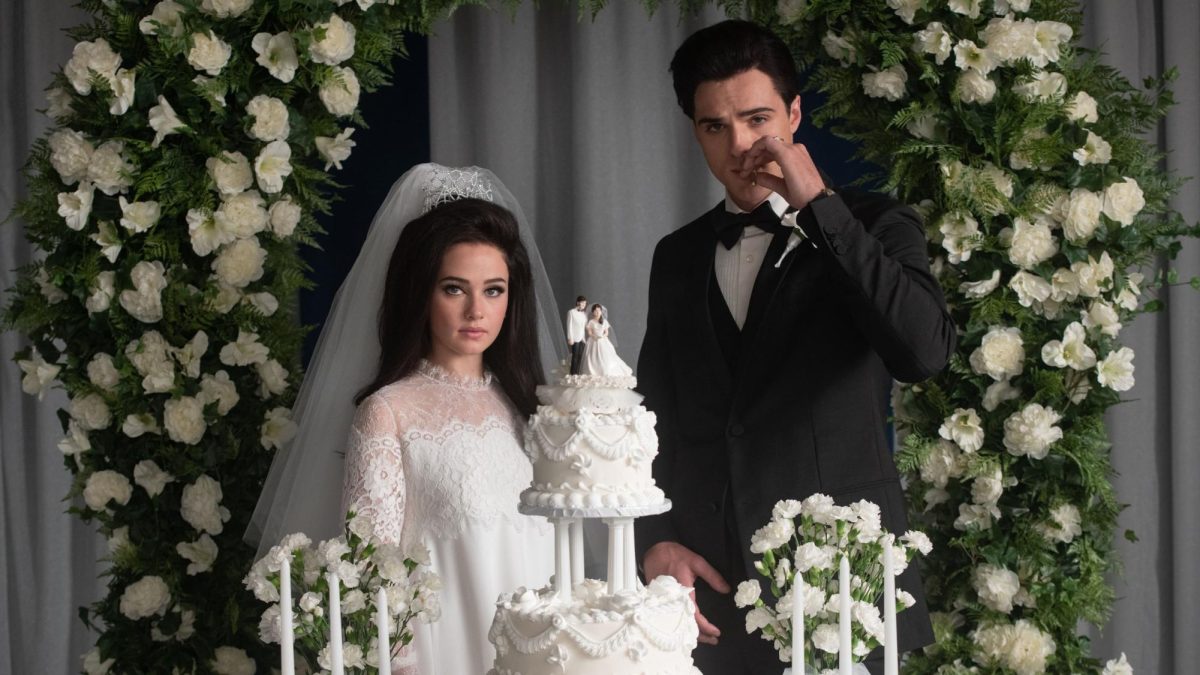Have you ever sat in a diner sipping on a Coke in the late 1950s? Well, neither have we, but Sofia Coppola makes you feel like you have in the opening scene of Priscilla, a biographic of Priscilla Presley’s rise to fame. Coppola’s newest film peels back the curtain into Priscilla and Elvis’s life in a way never seen before. As the dust settles from last year’s Elvis movie from Baz Luhrmann, Coppola releases a far more approachable view into the Presleys’s life that takes away all the glitz and glamor, perfectly leaving Priscilla’s story for us to see.
Coppola wrote the movie as an adaptation of Priscilla Presley’s 1985 book, Elvis and Me.
“We want it to feel like you’re always in Priscilla’s point of view,” said Coppola in an interview with Vanity Fair.
The acting performances by Cailee Spaeny and Jacob Elordi, who played Priscilla and Elvis, are worth celebrating. Spaeny carried out a subtle performance for Priscilla’s character for most of the movie, showing how Prisicilla was always in the shadows of Elvis’s life, having to do as he said. Her performance, although subtle, still showed the complexity of her situation, having been groomed as a teenager by Elvis and dealing with his abusiveness all while being trapped in love with him. Spaeny did a great job showing the dark nature of their relationship behind closed doors. As a relatively new actress, this will be a great breakout performance for her.
Throughout the peak of Baz Luhrmann’s Elvis there was so much emphasis on Austin Butler’s performance of Elvis that it became obnoxious. Fans even pointed out that he had kept the “Elvis voice” after filming ended. Elordi’s character work for Elvis was not touched on as much as Butler’s, which is honorable considering the film is about Priscilla and should only be highlighting her. While Butler’s accent was more produced and based on Elvis’s TV persona, Elordi approached the voice to not be Elvis on screen, but instead what he sounded like off screen.
“When we watched the film with Priscilla the first time, what struck her the most was how much his voice sounded like Elvis, so that was a big thrill,” Coppola said in an interview with Vanity Fair.
One of the more famous scenes from this movie is the wedding scene, in which Elordi and Spaeny stand around their cake, creating a picturesque tableaux that comes out great on film. This scene would not be half as astounding without Stacey Battat, the costume designer. Battat arranged it so that Spaeny’s dress was Chanel and Elordi’s tux was Valentino.
“Those costumes are so incredible…every time [Elordi] had one of them on, everyone gasped. They were like, ‘Oh my God, Elvis is in the room.’” Battat said in an interview with Entertainment Weekly.
Priscilla’s hair and makeup show the state of her marriage, another great tool used by Battat. In the beginning of their marriage when Elvis was more controlling, her hair was dyed black and done up, and she wore thick eyeliner just as he asked. Coppola depicted the constant male gaze Priscilla was under when she was with Elvis. Following Elvis was a posey of bachelor men who acted as an echo to Elvis’s opinion. Towards the end of the movie and near the end of Priscilla’s marriage with Elvis, her hair and makeup was what she wanted it to be, not him.
A third Presley is added to the mix after their marriage: Lisa Preseley. The daughter wasn’t included in the film much, but when she was, it seemed she was more an accessory to the couple’s relationship rather than a part of the family. This was especially clear in a scene where the family is having a photoshoot. Toddler Lisa very clearly expresses her disinterest in the family and how she’d rather be with the maid. This scene was a statement on Lisa’s upbringing and how her early years were spent away from the Presleys. In the scene, Spaeny made it obvious that Priscilla did not get a chance to mother her. She sacrificed raising Lisa to be a maternal figure to her husband, following him around rather than her child. After this, we see Priscilla fully step up for Lisa.
This film highlights Priscilla’s perspective, but some viewers were upset with how Elvis is portrayed. The film only shows Elvis’s darker side because of its direct effect on Priscilla. Showing Elvis in a way that people don’t want to see disturbs his “King” image, but this film is not about the King, it’s about the Queen.

